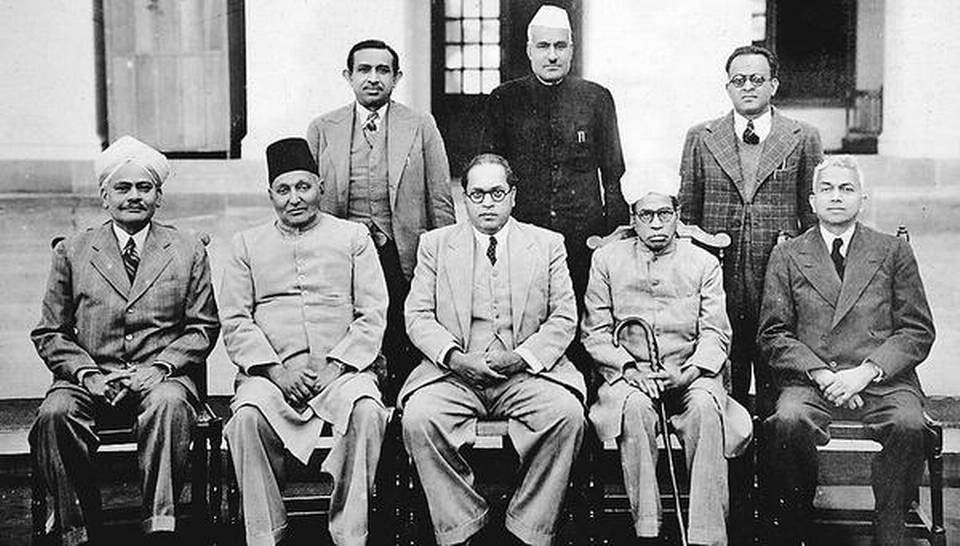A pioneering social reformer, jurist, economist, author, polyglot orator, scholar of comparative religions and thinker Dr. Bhimrao Ramji Ambdekar, the principal architect of Indian Constitution and independent India’s first law minister, was a multi-faceted man who remapped the frontiers of human achievement by his sheer tenacity, perseverance and the will to excel against all odds.
Babasaheb, as he was fondly called by friends, admirers and followers, braved the walls of prejudice and caste discrimination in early 20th century India to emerge as an exemplar and an unflinching crusader against the inequities of caste system and socio-economic deprivation that afflicted millions of Indians. His life is an inspirational story of achievements despite trying circumstances and the indomitable will to move beyond individual strife for the larger cause of social justice and national renaissance.
Born into the Hindu Mahar caste, which was scorned as “untouchable” by the upper class of the time, Babasaheb did not allow the limitations of his background to come in the way of acquiring first-rate education and pushing the bar for academic excellence. He earned a law degree from Lincoln’s Inn and doctorates from Columbia University in the US and the London School of Economics, carving a place of eminence as a scholar extraordinaire for his research in law, economics and political science. His early career saw him donning many hats: economist, professor, and lawyer. In the next stage, he emerged as a national leader with a pan-India vision of modernity underpinned by the ideals of social justice and equality. As India’s freedom movement gained traction, he harnessed his formidable intellectual energies to script an anthem of an inclusive India and strove tirelessly for political rights and social freedom for Dalits and the marginalized groups.
India’s tryst with destiny, as India’s first Prime Minister Jawaharlal Nehru spoke eloquently about at the fateful hour of India’s independence, saw Dr. Ambedkar being entrusted with a monumental responsibility: he was appointed Chairman of the Constitution Drafting Committee on August 29, 1947. He fashioned a pluralistic and inclusive Constitution that guides and animates India to this day, guaranteeing equal opportunity and freedom of expression and faith for all citizens in a secular democracy. Famous scholar Granville Austin has evoked the revolutionary spirit of Dr. Ambdekar that is reflected in the Indian Constitution. “The majority of India’s constitutional provisions are either directly arrived at furthering the aim of social revolution or attempt to foster this revolution by establishing conditions necessary for its achievement,” wrote Austin. The Constitution, drafted under Dr. Ambedkar’s leadership, abolished untouchability, and outlawed all forms of discrimination. An ardent proponent of the rights of women, minorities and the socially underprivileged, he argued eloquently and won the Constituent Assembly’s support for introducing a system of reservations of jobs in the civil services, schools and colleges for members of Scheduled Castes, Scheduled Tribes and Other Backward Class. This was later reflected in the policies of affirmative action adopted by the Indian government.
An erudite economist and institution-builder, Dr. Ambedkar authored many scholarly treatises on economics and was the driving force behind establishment of the Finance Commission of India. His ideas also laid the foundation for the setting up of India’s central bank, the Reserve Bank of India.
While Dr. Ambedkar’s achievements were manifold and straddled a wide spectrum, his inner life was richer and marked by spiritual vitality. In 1956, he converted to Buddhism. He later died in the same year in New Delhi while working on “The Buddha and his Dhamma”, which was published posthumously. The popularity and esteem he enjoyed among all lovers of social justice was seen at his funeral at Dadar Chowpatty beach on December 7, 1956, which was thronged by at least half a million mourners.
Babasaheb’s myriad contributions to the forging of a modern inclusive India were recognized posthumously through the Bharat Ratna in 1990. Dr. Ambedkar’s ideals of social inequality redesigned the contours of Indian politics. His surging popularity was reflected in scholarly biographies, numerous statues and memorials across the country. In 2012 Ambedkar was voted the “Greatest Indian” by a poll organized by History TV18 and CNN IBN.
Today, Ambedkar is revered nationally, and figures in the national pantheon as one of the makers of modern India, along with Gandhi, Nehru and Tagore. His birthday, April 14, has been christened as ‘Ambedkar Jayanti’ or ‘Bhim Jayanti’ and is celebrated as a public holiday.
As India celebrates the birth anniversary of this national icon, Babasaheb remains an inspiration for millions of Indians and proponents of equality and social justice across the globe. Fittingly, although it’s a matter of coincidence, one can see the trace of Babasaheb’s radiant vision in the “Sustainable Development Goals” that are set to be formally adopted by the UN General Assembly to eliminate poverty, hunger and socio-economic inequality by 2030.
Courtesy- Ministry of external affairs india

